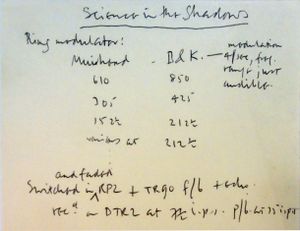Difference between revisions of "Science in the Shadows"
Martinwguy (talk | contribs) |
Martinwguy (talk | contribs) |
||
| (6 intermediate revisions by the same user not shown) | |||
| Line 1: | Line 1: | ||
{{Thumb|DD161018|[[DD161018]]}} | {{Thumb|DD161018|[[DD161018]]}} | ||
| − | [[Science in the Shadows]] was a one-hour BBC TV programme | + | [[Science in the Shadows]] was a one-hour<ref name=rsnr/> BBC TV programme following the Royal Society's publication of a report about the 'brain drain': the mass emigration from the UK of ‘scientists of very high quality’ whose loss ‘left serious gaps behind them’.<ref>''The emigration of scientists'' (Royal Society, London, 1963).</ref> |
| + | |||
| + | The Radio Times described the programme as: | ||
| + | <BLOCKQUOTE> | ||
| + | Britain's scientists are among the world's best and their brain power is our richest raw material. Why do so many of them feel frustrated? Is Britain failing to meet the challenge of the scientific revolution which is re-shaping much of the world? In this film the scientists speak out. | ||
| + | <BR>Scientific adviser, G. Rattray Taylor | ||
| + | <BR>Film editor, Ted Walter | ||
| + | <BR>Directed by MICHAEL LATHAM | ||
| + | <BR>Produced by GLYN JONES<ref name=genome>[http://genome.ch.bbc.co.uk/1ec77f48b1674043b974ecf0dd9ac729 Science in the Shadows] on the BBC Genome Project.</ref> | ||
| + | </BLOCKQUOTE> | ||
Delia's papers contain her notes for [[Science in the Shadows]], created by ring modulating the [[Muirhead]] and [[B & K]] oscillators, recording it at 7½ inches per second and playing it back at double speed.<ref>[[DD161018]]: Delia's handwritten notes for [[Science in the Shadows]].</ref> | Delia's papers contain her notes for [[Science in the Shadows]], created by ring modulating the [[Muirhead]] and [[B & K]] oscillators, recording it at 7½ inches per second and playing it back at double speed.<ref>[[DD161018]]: Delia's handwritten notes for [[Science in the Shadows]].</ref> | ||
| − | |||
| − | |||
| − | |||
=Availability= | =Availability= | ||
| − | * Broadcast on the 30th February 1963 | + | * Broadcast on the 30th February 1963<ref name=rsnr> |
| − | [http://rsnr.royalsocietypublishing.org/content/63/4/339.abstract ''The Royal Society and the ‘brain drain’: natural scientists meet social science''] | + | [http://rsnr.royalsocietypublishing.org/content/63/4/339.abstract#p-95 ''The Royal Society and the ‘brain drain’: natural scientists meet social science''], Brian Balmer, Matthew Godwin and Jane Gregory, 2009, note 36.</ref> or on 30th May 1963 at 21:25.<ref name=genome/> |
=References= | =References= | ||
Latest revision as of 18:41, 9 May 2016
Science in the Shadows was a one-hour[1] BBC TV programme following the Royal Society's publication of a report about the 'brain drain': the mass emigration from the UK of ‘scientists of very high quality’ whose loss ‘left serious gaps behind them’.[2]
The Radio Times described the programme as:
Britain's scientists are among the world's best and their brain power is our richest raw material. Why do so many of them feel frustrated? Is Britain failing to meet the challenge of the scientific revolution which is re-shaping much of the world? In this film the scientists speak out.
Scientific adviser, G. Rattray Taylor
Film editor, Ted Walter
Directed by MICHAEL LATHAM
Produced by GLYN JONES[3]
Delia's papers contain her notes for Science in the Shadows, created by ring modulating the Muirhead and B & K oscillators, recording it at 7½ inches per second and playing it back at double speed.[4]
Availability
References
- ↑ 1.0 1.1 The Royal Society and the ‘brain drain’: natural scientists meet social science, Brian Balmer, Matthew Godwin and Jane Gregory, 2009, note 36.
- ↑ The emigration of scientists (Royal Society, London, 1963).
- ↑ 3.0 3.1 Science in the Shadows on the BBC Genome Project.
- ↑ DD161018: Delia's handwritten notes for Science in the Shadows.
